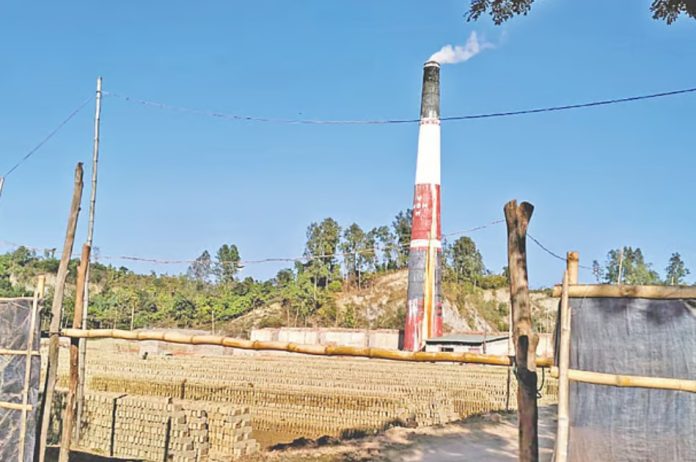The Faitong union of Lama upazila in Bandarban is shrouded in smoke from 36 illegally built brick kilns that are destroying hills and forests. Students and residents of two nearby primary schools are suffering from the heat and dust of the brick kilns. According to the Department of Environment, there is no other place in the country with so many brick kilns in such a small area.
There are a total of 119 illegal brick kilns in the পার্বত্য area, including Faitong. 36 of Bandarban’s 44 kilns are in Faitong alone. There are 29 in Rangamati and 46 in Khagrachhari. Although regular raids are conducted against these kilns, they are not permanently evicted.
These brick kilns are causing severe damage to the environment by cutting hills, using drum chimneys, and burning forest wood. It is alleged that the kilns cannot be shut down because the owners include leaders of the Awami League, BNP, and Jamaat-e-Islami, as well as businessmen, and because they obtain stay orders from the court through writ petitions.
On January 5, the High Court directed the district commissioners to take action against illegal brick kilns within a week. On January 25, 2022, the High Court ordered the closure of illegal brick kilns in response to a writ petition filed by Human Rights and Peace for Bangladesh (HRPB). However, HRPB alleges that proper eviction operations are not being carried out.
Md. Rezaul Karim, Assistant Director of the Bandarban Department of Environment, said, “None of the brick kilns here have validity. When we conduct operations, they show court orders and continue their activities.”
There are 5 brick kilns near Shibatali Para Government Primary School in Faitong. The students and teachers of the school are suffering from the smoke and dust of the brick kilns. The situation is the same at Rowajapara Moitri Government Primary School.
On January 20, 4 brick kilns in Faitong were fined 1.1 million taka. Upazila Executive Officer Rupayan Deb said that the operations would continue.
Moktar Ahmad, president of the Faitong Brickfield Owners Association, said, “We have court orders. Even then, the administration conducts operations. They are fining us for cutting trees and hills.”
Among the 46 brick kilns in Khagrachhari, those owned by Mohammad Salim, who is involved in BNP politics, former chairmen of the Zila Parishad Kongjuri Chowdhury and Mangsui Pru Chowdhury, and former vice-chairman of Sadar upazila Aktar Hossain are notable. Former State Minister Kujendra Lal Tripura’s kiln was in Dighinala upazila.
In Kawkhali, Rangamati, there is a brick kiln owned by Musa Matabbar, the general secretary of the district Awami League. In Longadu, former UP chairman Jasim Uddin and UP member Amin Hossain have brick kilns.
According to the Brick Preparation and Kiln Establishment (Control) Act, 2013, it is prohibited to set up brick kilns within half a kilometer of a hill or mound, within one kilometer of a residential area or educational institution, and within two kilometers of a forest area.
Environmental clearance, permission from the district administration, and the forest department are required to operate a brick kiln. But none of these kilns have any of these.
HRPB’s lawyer, Monzil Morshed, said, “There is no scope even to prepare for the establishment of a brick kiln in the hills. Fines are being imposed in the name of operations. These will be operational again in a few days. This game cannot be accepted.”
Studies have shown that brick kilns pollute the air, soil, and water and destroy forest vegetation. People in the vicinity of brick kilns suffer from various skin, lung, and respiratory diseases.


